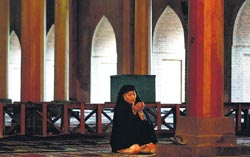|
A month
of spiritual nourishment
By Izhara Huzair Zubair
So very often have I been confronted
with the question, “Why do Muslims fast, what’s
the point of starving for 30 days?” Quite honestly,
I began to delve further into the subject, as a result
of such queries — for when one carries out practices
out of habit, it is quite easy to overlook their significance
or purpose.
 |
| A Kashmiri Muslim woman prays
inside the grand mosque in Srinagar, India, welcoming
the Muslim holy month of Ramadan. AP |
All religions are based on principles.
Islam, is founded on five such principles, from which
branch out the more detailed aspects of the teachings
and practices of Islam. Fasting forms the third tenet
of Islam, and requires Muslims to fast during the month
of Ramazan, the ninth month of the Islamic year. It
is obligatory for all, excluding small children, elderly
people and those who are very ill, to fast. Essentially,
fasting requires abstention from food, drink and sex
from sunrise to sun set. But what’s the purpose
of such an act, you may ask?
At one level, on the one hand, it
is God’s way of reminding us to appreciate what
we have on a daily basis and — may often than
not — be taking for granted; food. It would be
unusual not to feel hunger pangs, parched or even weak,
at some point of fasting. This combined with the first
sip of water at the time of breaking fast, could not
give one a greater sense of understanding of what it
must be like for those who go without food. It also
makes one appreciate having three square meals a day
in life.
On the other hand, fasting is a mode
of discipline:
O ye who believe!
Fasting is prescribed to you
As it was prescribed
To those before you
That ye may (learn)
Self-restraint.
(Surah Al Baqarah: verse 183)
It compels one’s mind and body
to abstain from the basic human needs, for a stipulated
period of time. Consider it an annual test, to forfeit
daily, physical needs, in order to nourish one’s
spiritual needs. In a way, it only further exemplifies
Islam being a way of life. Islam — just like any
of the other great religions — involves practising
it in accordance with certain conditions, in a particular
manner. For instance, Muslims have to pray five times
a day, yet, one cannot pray whenever one feels like,
but at stipulated times. Likewise, fasting can only
be done, in observation of certain instructions.
At a second level, devoid of all religious
interpretations, fasting serves another purpose. How
often does one get the opportunity to do good, in one’s
life? By this I mean, to make some sacrifice —
be it monetary or otherwise — of oneself, for
the benefit of someone else?
By no means shall ye
Attain righteousness unless
Ye give (freely) of that
Which ye love; and whatever
Ye give, of a truth
Allah knoweth it well. (Surah Ali Imran: verse 92)
It would not be far from the truth
to say, that the opportunities are few, given that people
exhaust a great proportion of their time struggling
just to get through daily routines, such as work, running
households, taking children to school and classes, paying
utility bills…the list is endless. One may make
the case that charity is done by way of giving something
to the beggar who haunts the traffic lights on the way
home, buying tickets for a charity show, dropping change
into donation tills in supermarkets, and so on. Yet,
in all these instances, no one is compelled to offer
charity — it is purely subjective. The mechanism
that Islam has put in place, is to make it compulsory
for every Muslim earning a steady income, to give 2
½ percent of his or her wealth – in the
form of money or grain – to those who desperately
need assistance. This obligatory due of charity, is
called Zakaat, and constitutes the fourth principle
of Islam.
So why place Ramazan and Zakaat side
by side? During Ramazan, fasting, prayers, the recitation
of the Quran and special prayers for the month (Tharaveeh),
all heighten one’s consciousness of God. It is
a time when one feels much humility and gratitude for
the blessings one has been endowed with, be it for having
food on the table to break fast or the finances to get
about life without too much hassle. One realises how
difficult it could be, in sight of those who labour
just to get by. In that frame of mind, Zakaat offers
a window, to put back something into society. Once a
year, God offers this great occasion, to ease the burden
of poor relations and needy people. By compelling our
hand — and for those who do not realise –
we are earning many a blessing.
To recap, the month of Ramazan calls
upon Muslims to fast, observing certain commands, in
respect and reverence of God. As a result of the disciplined
act, Muslims discover a higher level of spirituality,
thus setting the purpose to simultaneously fulfil the
obligatory act of charity, called Zakaat.
Given that the fast lasts thirty days,
it is a period that can significantly change a Muslim’s
outlook on life; to recognise that there is more to
our earthly existence that deserves our understanding
and devotion:
Let them also, with a will,
Listen to My call,
And believe in Me;
That they may walk
In the right way.
(Surah Al Baqarah: verse 186)
|
